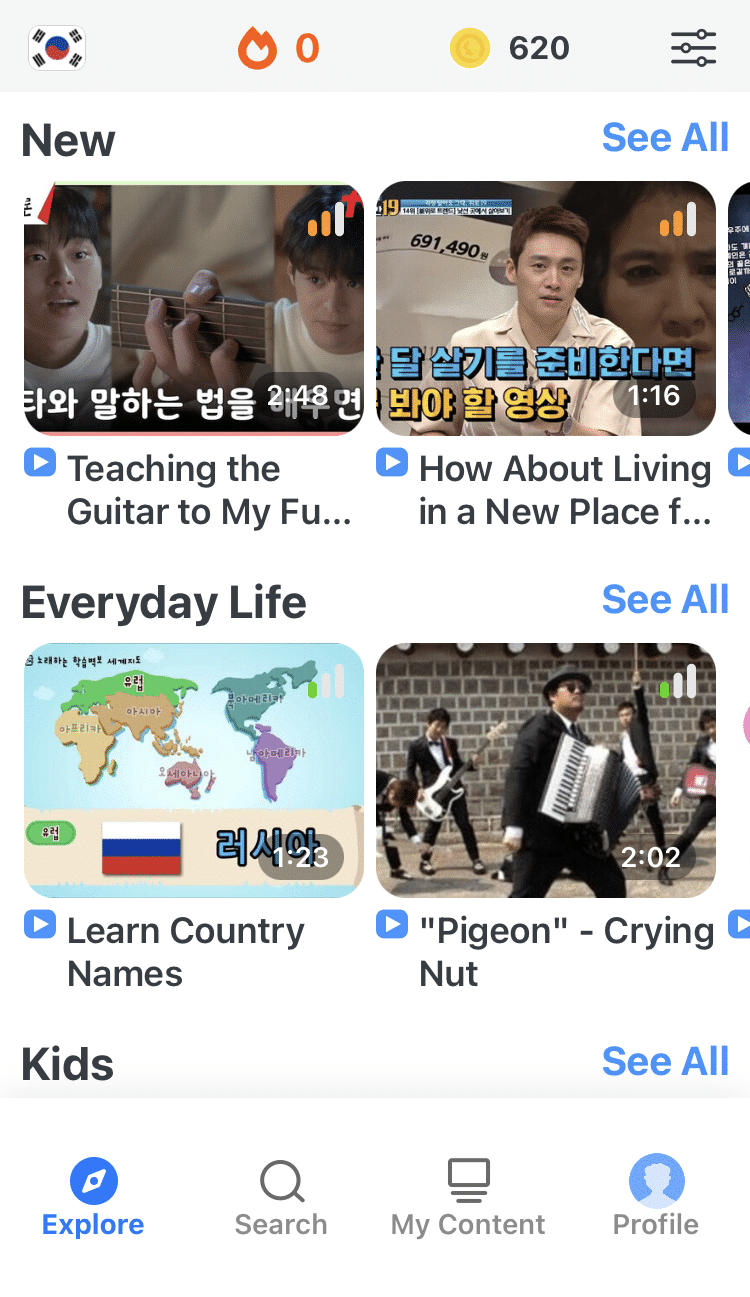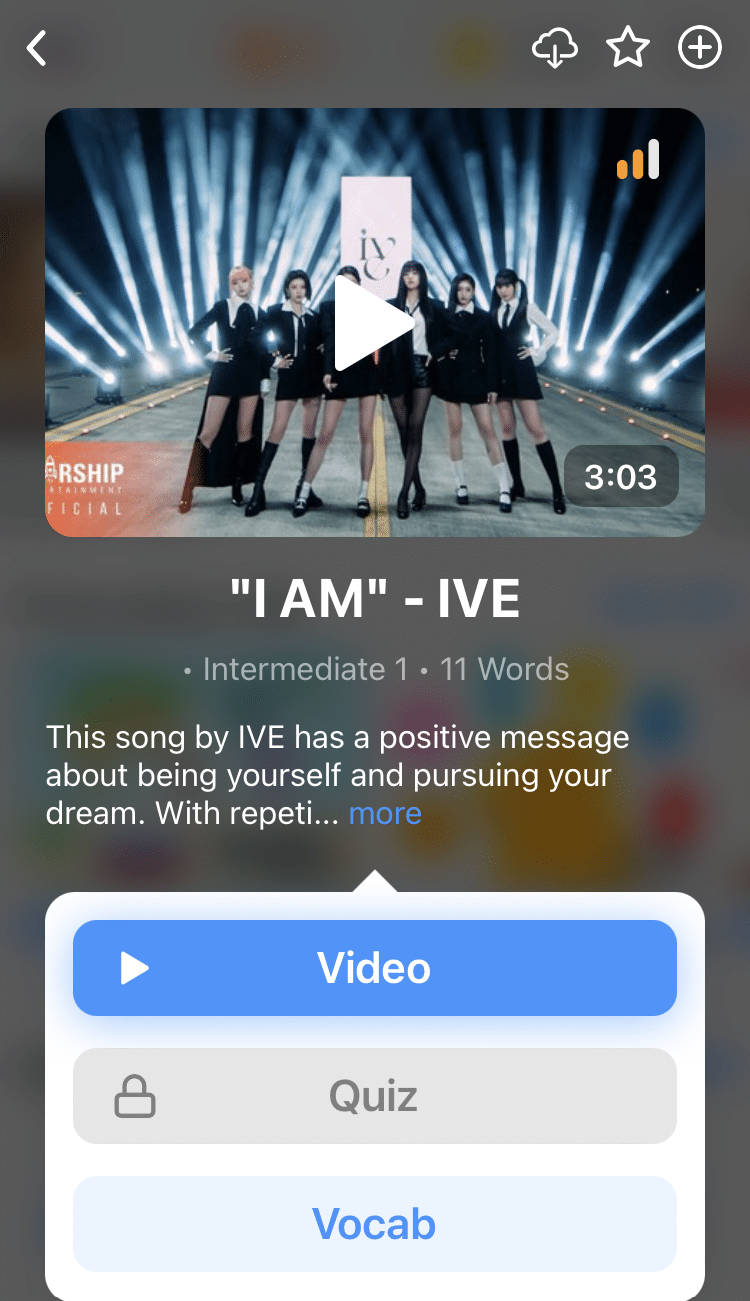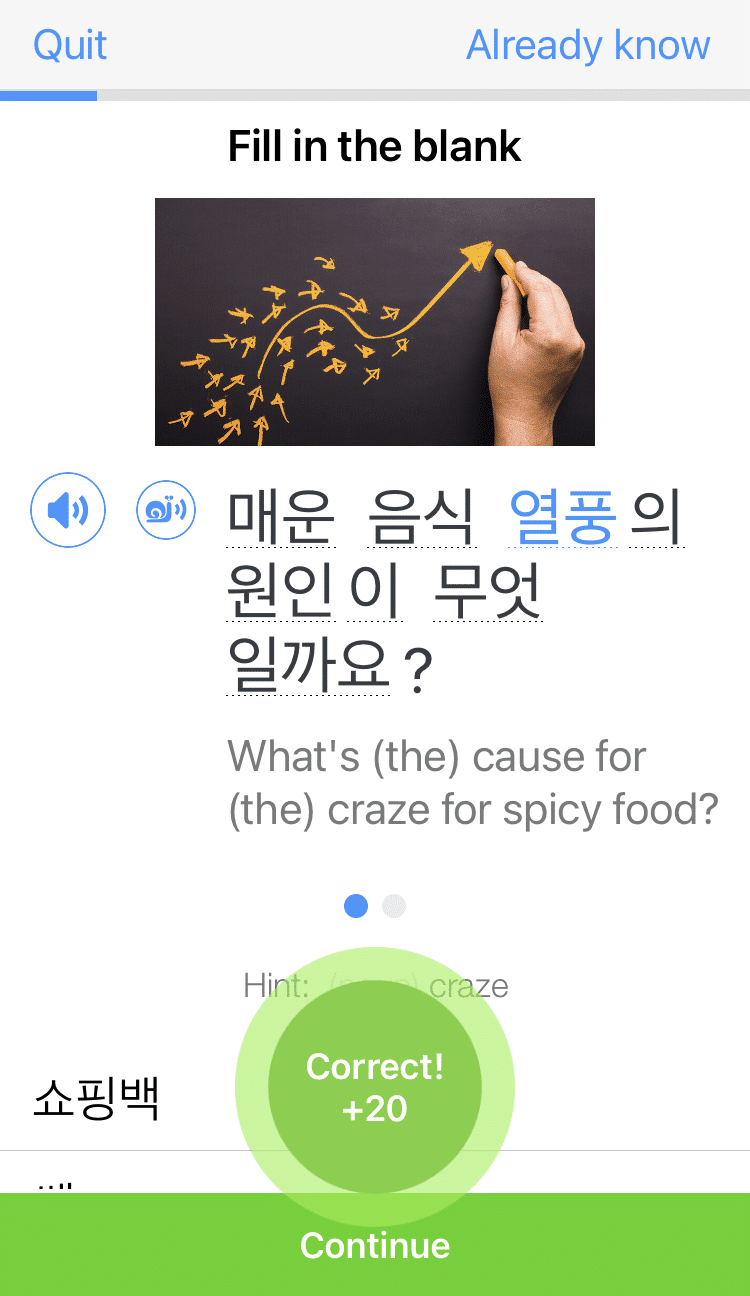
How to Talk About Money in Korean
Any language learning endeavor would be incomplete without a few cash-related vocabulary words up your sleeve.
In this guide, you’ll oearn how to talk about money in Korean, from the general terminology all the way to slang and more.
Contents
- How to Say “Money” in Korean
- Korean Money Vocabulary
- How to Talk About Money in Korean
- And One More Thing...
Download: This blog post is available as a convenient and portable PDF that you can take anywhere. Click here to get a copy. (Download)
How to Say “Money” in Korean
The Korean word for money is 돈 (don).
South Korean currency is called 원 (won). Its symbol is ₩ and it’s abbreviated as KRW.
The Won is further subdivided into 100 전 (jeon) but the symbol isn’t commonly used, as it’s more practical to refer to amounts in whole Wons. However, the division exists conceptually, with 100 Jeon making up 1 Won.
The Korean Won is available in both coins and banknotes. Coins come in denominations of 1, 5, 10, 50, 100 and 500 won, while banknotes are issued in denominations of 1,000, 5,000, 10,000 and 50,000 won.
Korean Money Vocabulary
Money has its own lingo, and if you plan to travel to Korea, you’ll need to know it to get around. Here’s all the vocabulary you need to know to talk about money in Korean.
General Money Vocabulary
| Korean | Pronunciation | English |
|---|---|---|
| 경제 | gyeongje | Economy |
| 동전 | dongjeon | Coin |
| 가격 | gageuk | Price |
| 비용 | biyong | Cost / Expense |
| 수입 | suip | Income |
| 지출 | jichul | Expenditure |
| 현금 | hyeongeum | Cash |
| 정가 | jeongga | Full price |
| 할인 | harin | Discount |
| 환불 | hwanbul | Refund |
| 영수증 | yeongsujeung | Receipt |
| 빚 | bit | Debt |
| 월세 | wolse | Monthly rent |
| 가계 | gagye | Household finances |
| 중산층 | jungsancheung | Middle class |
| 용돈 | yongdon | Allowance |
| 푼돈 | pundon | Pocket money |
| 돈벌이 | donbeori | Making money |
| 비싼 | bissan | Espensive |
| 싼 | ssan | Cheap |
| 저렴한 | jeoryeomhan | Cheap |
| 귀중한 | gwijunghan | Valuable |
| 부유한 | buyuhan | Rich |
| 가난한 | gananhan | Poor |
Banking and Financial Terms
| Korean | Pronunciation | English |
|---|---|---|
| 지폐 | jipye | Banknote |
| 은행 | eunhaeng | Bank |
| 예금 | yegum | Deposit |
| 계좌 | gyejwa | Account |
| 계좌 명세서 | gyejwa myeongseseo | Statement of account |
| 예금주 | yegumju | Account holder |
| 대출 | daechul | Loan |
| 이자 | ija | Interest |
| 이자율 | ijayul | Interest rate |
| 이자 계산 | ija gyesan | Interest calculation |
| 수수료 | susuryo | Fee / Commission |
| 통장 | tongjang | Passbook |
| 신용 | sinyong | Credit |
| 신용 카드 | sinyong kadeu | Credit card |
| 신용 등급 | sinyong deunggeup | Credit rating |
| 직불 카드 | jikbul kadeu | Debit card |
| 출금 | chulgeum | Withdrawal |
| 이체 | iche | Transfer |
| 자동 이체 | jadong iche | Automatic transfer |
| 환전 | hwanjeon | Currency exchange |
| 환율 | hwanyul | Exchange rate |
| 수표 | supyo | Check |
| 보험 | boheom | Insurance |
| 금융 | geumyung | Finance |
| 증권 | jeunggweon | Securities |
| 주식 | jusik | Stocks |
| 주식 시장 | jusik sijang | Stock market |
| 투자 | tuja | Investment |
| 수익 | suik | Profit |
| 손실 | sonsil | Loss |
| 자산 | jasan | Assets |
| 부채 | buchae | Liabilities |
| 세금 | segeum | Tax |
| 세금 신고 | segeum singo | Tax filing |
| 과세 평가 | gwase pyeongga | Tax assessment |
| 급여 | geubyeo | Salary |
| 현금 인출기 | hyeongeum inchulgi | ATM (Automated Teller Machine) |
| 잔고 | jango | Balance |
Korean Slang for Money
Got some cash? Can you spare a buck? Every language has its own unique ways to refer to the dough. Here’s some Korean money slang to make you sound more natural when you’re discussing your finances.
- 돈맛 (don mat) — A taste for money, referring to the enjoyment of spending money
- 돈봉투 (don bongtu) — Money envelope, often used for gifts or bonuses
- 풍년 (pungnyeon) — A year of financial abundance or prosperity
- 깡패 (kkangpae) — Originally meaning “gangster,” this is sometimes used to refer to someone with a lot of money or financial power
- 현금 (hyeongeum) — Cash, literally translated as “ready money”
- 떼돈을 벌다 (ttedoneul beolda) — To make a fortune, similar to the English phrase “to make a killing”
- 흙수저 (heuksoojeo) — Someone born into a poor family, literally meaning “dirt spoon” as a twist on the phrase that someone is born with a silver spoon in their mouth
- 월급쟁이 (wolgeupjaengi) — A salaryman, or someone who relies on a monthly salary
- 돈벼락 (donbyeolak) — A sudden and unexpected large amount of money, like a financial windfall
- 빈털터리 (binteolteori) — Empty pockets, referring to someone with no money
- 달러 (dalleo) — Dollar, used in a similar way as you’d use “bucks” in English
- 사과 박스 (sagwa bakseu) — Literally meaning “apple box,” this refers to corrupt politicians sending cash inside boxes as bribes, and as such the slang term can be used to mean “bribe”
- 푼 (pun) — Used for counting money, this word can be used to refer to cash in general, and is also found in the phrase 어림 반 푼어치도 없다 (eorim ban puneochido eopda), meaning “to not even be worth half a penny”
- 금전욕 (geumjeonyok) — A lust for money
- 땡 (ttaeng) — Literally meaning “ding,” this word is used to denote good luck or fortune
- 파산 (pasan) — Means to go broke
If all this slang is new to you, then you may want to take a step away from the textbook and dive into the authentic content of the FluentU language learning program. FluentU takes authentic videos—like music videos, movie trailers, news and inspiring talks—and turns them into personalized language learning lessons. You can try FluentU for free for 2 weeks. Check out the website or download the iOS app or Android app. P.S. Click here to take advantage of our current sale! (Expires at the end of this month.)
How to Talk About Money in Korean
You have the vocabulary down, now it’s time to actually use it. (Though if you end up in a tricky situation, don’t feel bad about asking to switch to English—money matters!)
Read on to see some common phrases and situations related to Korean money that you might encounter in everyday life.
Counting Money
To count money, simply say the number followed by won. For example:
- 천 원 (cheon won) — One thousand won
- 만 원 (man won) — Ten thousand won
- 백만 원 (baekman won) — One million won
Counting bills? Add 권 (gwon), like this:
- 만 원권 (Man wongwon) — Ten thousand won bill
- 오만 원권 (Oman wongwon) —Fifty thousand won bill
- 백만 원권 (baekman wongwon) — One million won bill
You can study Korean numbers and counting with this blog post:
Korean Numbers and Counting [Native and Sino-Korean] | FluentU Korean Blog
Korean numbers are everywhere, meaning that it is important that you know them. This post will cover how to count in both the native Korean and Sino-Korean number systems.…
Bargaining and Negotiating
Korea isn’t big on bargaining, and you’ll only find haggling commonplace in the more rural areas. Still, you may find yourself in the position to negotiate, in which case you can use these phrases and sentences:
- 가격을 어떻게 조정할 수 있을까요? (Gagyeogeul eotteoke jojeonghal su isseulkkayo?) — How can we adjust the price?
- 좀 더 할인해 주실 수 있을까요? (Jom deo harinhae jusil su isseulkkayo?) — Can you give me a further discount?
- 다른 조건을 제안해 볼까요? (Dareun jogeoneul jeanhae bolkkayo?) — Shall we propose different terms?
- 협상의 여지가 있을 것 같습니다. (Hyeopsangui yeojiga isseul geot gatseumnida.) — There seems to be room for negotiation.
- 우리가 모두 만족할 수 있는 해결책을 찾아 봅시다. (Uriga modu manjokal su inneun haegyeolchaegeul chaja bopsida.) — Let’s find a solution that satisfies everyone.
- 양측이 모두 양보해야 합의에 도달할 수 있습니다. (Yangcheugi modu yangbohaeya habuie dodalhal su itseumnida.) — Both sides need to compromise for an agreement to be reached.
- 현재 제안된 가격에 대해 논의해 보겠습니다. (Hyeonjae jeandoen gagyeoge daehae nonuihae bogetseumnida.) — Let’s discuss the proposed price.
- 양측이 만족할 만한 중간 지점을 찾아 봅시다. (Yangcheugi manjokal manhan junggan jijeomeul chaja bopsida.) — Let’s find a mutually satisfactory middle ground.
Here are some more vocabulary words that might come in useful for negotiations:
| Korean | Pronunciation | English |
|---|---|---|
| 협상 | hyeopsang | Negotiation |
| 흥정 | heungjeong | Haggling |
| 조건 | jogeon | Terms and conditions |
| 할인 | harin | Discount |
| 타협 | tahyeop | Compromise |
| 상의 | sangi | Consultation |
| 교섭 | gyoseob | Bargaining |
| 협의 | hyeobui | Agreement |
| 제안 | jean | Proposal |
| 보상 | bosang | Compensation |
| 합의 | hapui | Consensus |
| 대화의 기술 | daehwaui gisul | Communication skills |
| 신뢰 | ssilloe | Trust |
Asking About Prices
Even if you don’t find yourself haggling for a better price, asking how much something costs is a skill you’ll need to have if you travel to Korea. Here are some common vocabulary words, phrases and sentences you may need to use in your shopping excursions:
- 가격 (gagyeok) — Price
- 비용 (bi-yong) — Cost
- 얼마예요? (Eolmayeyo?) — How much is it?
- 이 제품은 가격이 어떻게 되나요? (I jepumeun gagyeogi eotteoke doenayo?) — What is the price of this product?
- 할인이 있나요? (Harini innayo?) — Is there a discount?
- 현금으로 지불하면 할인이 될까요? (Hyeongeumeuro jibulhamyeon harini doelkkayo?) — Can I get a discount if I pay in cash?
- 무료인가요? (Muryoingayo?) — Is it free?
- 이 가격에는 세금이 포함되어 있나요? (I gagyeogeneun segeumi pohamdoeeo innayo?) — Does this price include taxes?
- 추가 비용이 있을까요? (Chuga biyongi isseulkkayo?) — Are there any additional costs?
- 어떤 결제 방법이 있나요? (Eotteon gyeolje bangbeobi innayo?) — What payment methods are available?
- 할부로 결제할 수 있을까요? (Halburo gyeoljehal su isseulkkayo?) — Can I pay in installments?
- 이 가격에는 어떤 서비스가 포함되어 있나요? (I gagyeogeneun eotteon seobiseuga pohamdoeeo innayo?) — What services are included in this price?
- 저렴한 대체품이 있을까요? (Jeoryeomhan daechepumi isseulkkayo?) — Are there more affordable alternatives?
You’re a little richer thanks to this post—your knowledge bank is full of ways to talk about money in Korean!
If you enjoyed this post, you're already halfway to having the time of your life learning Korean with FluentU!
FluentU makes it possible to learn with K-pop videos, funny commercials, entertaining web series and more. Just a quick look will give you an idea of the variety of FluentU videos on offer:
FluentU really takes the grunt work out of learning languages, leaving you with nothing but engaging, effective and efficient learning. It's already hand-picked the best videos for you (which are organized by level and topic), so all you have to do is simply choose any video that strikes your fancy to get started.
Each word in the interactive captions comes with a definition, audio, image, example sentences and more.
Access a complete interactive transcript of every video under the Dialogue tab, and easily review words and phrases from the video under Vocab.
You can use FluentU’s unique Quiz Mode to learn the vocabulary and phrases from the video through fun questions.
FluentU keeps track of what you're learning, and tells you exactly when it's time for review, giving you a 100% personalized experience.
Review sessions use video context to help embed the words in your memory.
Start using the FluentU website on your computer or tablet or, better yet, download the FluentU app from the iTunes or Google Play store. Click here to take advantage of our current sale! (Expires at the end of this month.)
And One More Thing...







